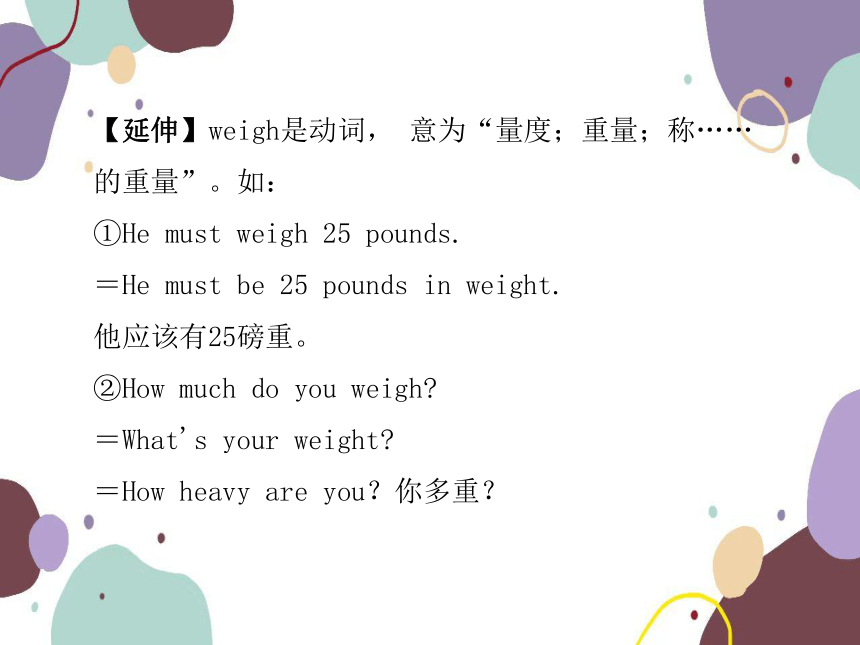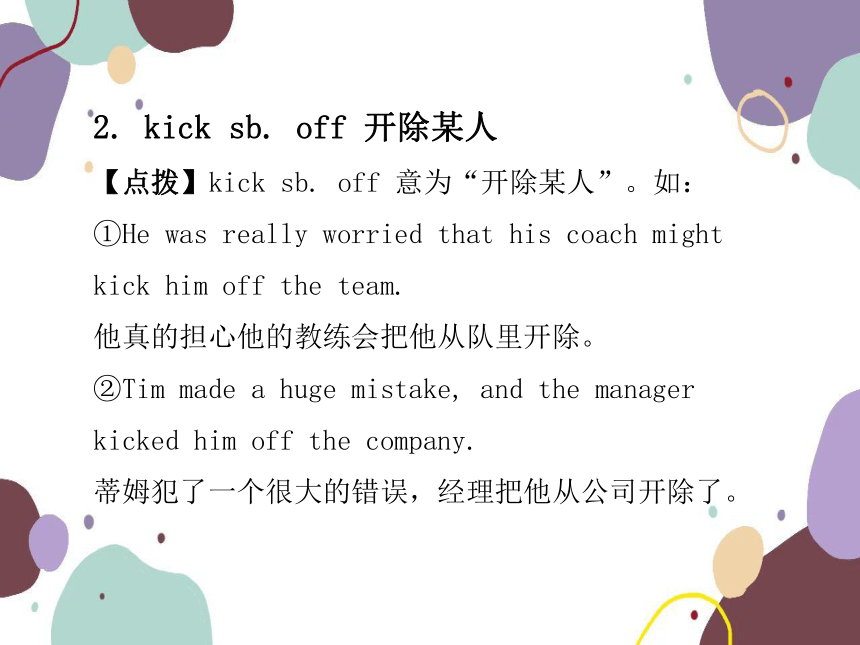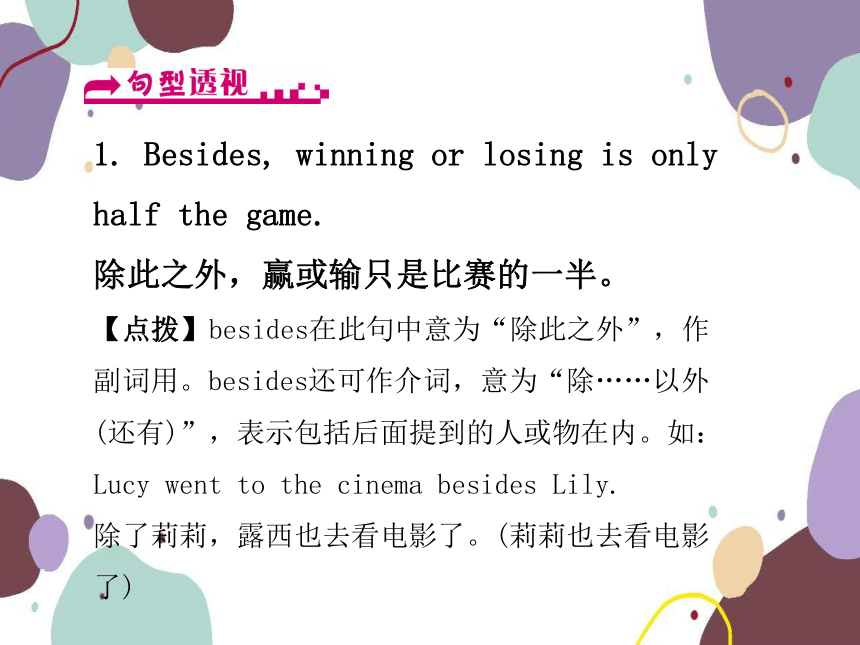人教版Unit 11Sad movies make me cry.(Section B 2a-2e)单词讲解课件(共12张PPT)
文档属性
| 名称 | 人教版Unit 11Sad movies make me cry.(Section B 2a-2e)单词讲解课件(共12张PPT) |  | |
| 格式 | pptx | ||
| 文件大小 | 219.4KB | ||
| 资源类型 | 教案 | ||
| 版本资源 | 人教新目标(Go for it)版 | ||
| 科目 | 英语 | ||
| 更新时间 | 2022-10-25 13:23:01 | ||
图片预览






文档简介
(共12张PPT)
Unit 11 Sad movies make me cry.
Period 4(Section B 2a-2e)
教学目标 1. 能注意用俗语和固定词组的积累来帮助学习英语2. 能理解他人的感受和正确处理日常生活中碰到的问题3. 面对失败,能保持积极乐观的人生态度4. 能用make+sb.+adj.和make+sb.+do描述感觉
重点词汇 weight, shoulder, goal, let... down, coach, kick, kick sb. off, be hard on sb., courage, rather than, pull, pull together, nod, agreement, disappoint
重点句型 ①His stupid mistake made him angry.②Peter heard his father knocking on his bedroom door.③To his surprise and relief, his teammates all nodded in agreement.④It made him feel lucky to know that he was on a winning team.
难点 Whatever it was, don't be too hard on yourself.
1. weight 重量;分量
【点拨】weight是名词, 意为“体重;重量”。如:
①Your weight is fine. 你的体重刚刚好。
②He has put on weight since I last saw him.
自从我上次见到他以来,他又长胖了。
③The loss of the money has been a weight on my mind.
丢钱的事总是压在我心里。
【延伸】weigh是动词, 意为“量度;重量;称……的重量”。如:
①He must weigh 25 pounds.
=He must be 25 pounds in weight.
他应该有25磅重。
②How much do you weigh
=What's your weight
=How heavy are you?你多重?
2. kick sb. off 开除某人
【点拨】kick sb. off 意为“开除某人”。如:
①He was really worried that his coach might kick him off the team.
他真的担心他的教练会把他从队里开除。
②Tim made a huge mistake, and the manager kicked him off the company.
蒂姆犯了一个很大的错误,经理把他从公司开除了。
1. Besides, winning or losing is only half the game.
除此之外,赢或输只是比赛的一半。
【点拨】besides在此句中意为“除此之外”,作副词用。besides还可作介词,意为“除……以外(还有)”,表示包括后面提到的人或物在内。如:
Lucy went to the cinema besides Lily.
除了莉莉,露西也去看电影了。(莉莉也去看电影了)
【延伸】except作介词,也有“除去……”之意,但不包括后面所提到的人或物在内。如:
All the students went to the park except Jim.除了吉姆,所有的学生都去公园了。(吉姆没去)
2. The next day, Peter went to soccer practice with courage rather than fear in his heart.
第二天,彼得没有心存恐惧,而是鼓足勇气去参加了足球训练。
【点拨】(1)rather than意为“而不是”。连接两个相同词性的词。如:
①He is an explorer rather than a sailor.
与其说他是一个海员,不如说他是一个探险者。
②You rather than I are going to the concert.
是你而不是我要去音乐会。(rather than连接两个名词或代词作主语时,谓语动词应与rather than前面的名词或代词在人称和数上保持一致)
③We will have the meeting in the classroom rather than in the great hall.
我们是在教室里开会,不是在大厅里。
④I decided to send a message rather than(to) telephone.
我决定发短信而不是打电话。(rather than后接不定式时,不定式可以带to,也可以不带to)
(2)rather than与would连用时,构成“would rather... than...”句式,意为“宁愿……也不愿……”,表示主观愿望,即在两者之中选择其一。如:
She'd rather die than lose the children.
她宁愿死也不愿失去孩子们。
3. To his surprise and relief, his teammates all nodded in agreement.
令他感到吃惊和安慰的是,他的队友都赞同地点头了。
【点拨】(1)to one's surprise意为“使某人吃惊的是;使某人惊奇的是”。通常用作插入语,用逗号与后面的部分隔开。如:
To his surprise, the lost pencil is in his pencil box.
使他吃惊的是,丢失了的铅笔就在他的铅笔盒里。
【辨析】surprise, surprised与surprising
surprised与surprising都是由surprise变化而来的,其具体用法如下:
(1)surprise作名词时,意为“惊奇;惊讶”;作动词时,意为“使……感到惊讶”。
(2)surprised作形容词,意为“对……感到惊奇的”,主语多是人,其后可接介词at或by。
(3)surprising作形容词,意为“令人惊奇的”,作表语时,主语多是事物。
【点拨】(2)relief是名词,意为“轻松;解脱”,其动词形式是relieve。如:
①It was a great relief to find the children safe.
发现孩子们平安无事真是莫大的安慰。
②We were relieved to hear that you had arrived safely.
听到你已安全到达,我们就安心了。
【点拨】(3)in agreement放在句末作状语,也常与be动词连用。be in agreement意为“意见一致”,相当于agree。如果要表示“对某事意见一致”,可与on/about sth.连用。如:
We are in agreement on that question.
=We agree on that question.
对于那个问题我们意见一致。
Unit 11 Sad movies make me cry.
Period 4(Section B 2a-2e)
教学目标 1. 能注意用俗语和固定词组的积累来帮助学习英语2. 能理解他人的感受和正确处理日常生活中碰到的问题3. 面对失败,能保持积极乐观的人生态度4. 能用make+sb.+adj.和make+sb.+do描述感觉
重点词汇 weight, shoulder, goal, let... down, coach, kick, kick sb. off, be hard on sb., courage, rather than, pull, pull together, nod, agreement, disappoint
重点句型 ①His stupid mistake made him angry.②Peter heard his father knocking on his bedroom door.③To his surprise and relief, his teammates all nodded in agreement.④It made him feel lucky to know that he was on a winning team.
难点 Whatever it was, don't be too hard on yourself.
1. weight 重量;分量
【点拨】weight是名词, 意为“体重;重量”。如:
①Your weight is fine. 你的体重刚刚好。
②He has put on weight since I last saw him.
自从我上次见到他以来,他又长胖了。
③The loss of the money has been a weight on my mind.
丢钱的事总是压在我心里。
【延伸】weigh是动词, 意为“量度;重量;称……的重量”。如:
①He must weigh 25 pounds.
=He must be 25 pounds in weight.
他应该有25磅重。
②How much do you weigh
=What's your weight
=How heavy are you?你多重?
2. kick sb. off 开除某人
【点拨】kick sb. off 意为“开除某人”。如:
①He was really worried that his coach might kick him off the team.
他真的担心他的教练会把他从队里开除。
②Tim made a huge mistake, and the manager kicked him off the company.
蒂姆犯了一个很大的错误,经理把他从公司开除了。
1. Besides, winning or losing is only half the game.
除此之外,赢或输只是比赛的一半。
【点拨】besides在此句中意为“除此之外”,作副词用。besides还可作介词,意为“除……以外(还有)”,表示包括后面提到的人或物在内。如:
Lucy went to the cinema besides Lily.
除了莉莉,露西也去看电影了。(莉莉也去看电影了)
【延伸】except作介词,也有“除去……”之意,但不包括后面所提到的人或物在内。如:
All the students went to the park except Jim.除了吉姆,所有的学生都去公园了。(吉姆没去)
2. The next day, Peter went to soccer practice with courage rather than fear in his heart.
第二天,彼得没有心存恐惧,而是鼓足勇气去参加了足球训练。
【点拨】(1)rather than意为“而不是”。连接两个相同词性的词。如:
①He is an explorer rather than a sailor.
与其说他是一个海员,不如说他是一个探险者。
②You rather than I are going to the concert.
是你而不是我要去音乐会。(rather than连接两个名词或代词作主语时,谓语动词应与rather than前面的名词或代词在人称和数上保持一致)
③We will have the meeting in the classroom rather than in the great hall.
我们是在教室里开会,不是在大厅里。
④I decided to send a message rather than(to) telephone.
我决定发短信而不是打电话。(rather than后接不定式时,不定式可以带to,也可以不带to)
(2)rather than与would连用时,构成“would rather... than...”句式,意为“宁愿……也不愿……”,表示主观愿望,即在两者之中选择其一。如:
She'd rather die than lose the children.
她宁愿死也不愿失去孩子们。
3. To his surprise and relief, his teammates all nodded in agreement.
令他感到吃惊和安慰的是,他的队友都赞同地点头了。
【点拨】(1)to one's surprise意为“使某人吃惊的是;使某人惊奇的是”。通常用作插入语,用逗号与后面的部分隔开。如:
To his surprise, the lost pencil is in his pencil box.
使他吃惊的是,丢失了的铅笔就在他的铅笔盒里。
【辨析】surprise, surprised与surprising
surprised与surprising都是由surprise变化而来的,其具体用法如下:
(1)surprise作名词时,意为“惊奇;惊讶”;作动词时,意为“使……感到惊讶”。
(2)surprised作形容词,意为“对……感到惊奇的”,主语多是人,其后可接介词at或by。
(3)surprising作形容词,意为“令人惊奇的”,作表语时,主语多是事物。
【点拨】(2)relief是名词,意为“轻松;解脱”,其动词形式是relieve。如:
①It was a great relief to find the children safe.
发现孩子们平安无事真是莫大的安慰。
②We were relieved to hear that you had arrived safely.
听到你已安全到达,我们就安心了。
【点拨】(3)in agreement放在句末作状语,也常与be动词连用。be in agreement意为“意见一致”,相当于agree。如果要表示“对某事意见一致”,可与on/about sth.连用。如:
We are in agreement on that question.
=We agree on that question.
对于那个问题我们意见一致。
同课章节目录
- Unit 1 How can we become good learners.
- Section A
- Section B
- Unit 2 I think that mooncakes are delicious!
- Section A
- Section B
- Unit 3 Could you please tell me where the restroom
- Section A
- Section B
- Unit 4 I used to be afraid of the dark.
- Section A
- Section B
- Unit 5 What are the shirts made of?
- Section A
- Section B
- Review of Units 1-5
- Unit 6 When was it invented?
- Section A
- Section B
- Unit 7 Teenagers should be allowed to choose their
- Section A
- Section B
- Unit 8 It must belong to Carla.
- Section A
- Section B
- Unit 9 I like music that I can dance to.
- Section A
- Section B
- Unit 10 You're supposed to shake hands.
- Section A
- Section B
- Review of Units 6-10
- Unit 11 Sad movies make me cry.
- Section A
- Section B
- Unit 12 Life is full of the unexpected
- Section A
- Section B
- Unit 13 We're trying to save the earth!
- Section A
- Section B
- Unit 14 I remember meeting all of you in Grade 7.
- Section A
- Section B
- Review of Units 11-14
